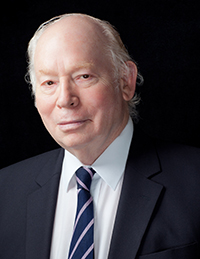Steven Weinberg, Ph.D.
Steven Weinberg is one of the world’s preeminent theoretical physicists, whose contributions to the Standard Model of particle physics help to explain how the fundamental forces of the universe govern the elementary particles. He is the author of 15 books, a spokesperson for the public support of science, and a scientific consultant to government agencies and independent advisory groups.
Dr. Weinberg shared the Nobel Prize in Physics in 1979 for his work on the unification of electromagnetism and the weak nuclear force. His research has primarily been in particle physics, quantum field theory, gravity, supersymmetry, and cosmology. His explorations of the cosmological constant problems provide some support for the prediction of a multiverse.
Born in New York City, Dr. Weinberg received an A.B. from Cornell in 1954, studied in Copenhagen, and received a Ph.D. from Princeton in 1957. He has taught at Columbia, Berkeley, MIT, and Harvard, where he was Higgins Professor of Physics. In 1982, Dr. Weinberg joined the physics and astronomy departments of the University of Texas, at Austin, where he is Josey Regental Chair in Science. He is a member of the National Academy of Sciences and Britain’s Royal Society. In addition to the Nobel Prize, Dr. Weinberg’s numerous honors include a 1991 National Medal of Science and the 2004 Benjamin Franklin Medal from the American Philosophical Society.
Dr. Weinberg has served as a consultant at the U.S. Arms Control and Disarmament Agency, and he was a member of JASON—an independent advisory group to the U.S. government on matters of science and technology.
An author of more than 300 scientific papers and treatises on general relativity, quantum mechanics, quantum field theory, and cosmology, Dr. Weinberg has also written several acclaimed books for the general reader. They include The First Three Minutes: A Modern View of the Origins of the Universe, which has been printed in over 20 languages, and Dreams of a Final Theory. He also regularly contributes essays to The New York Review of Books. In 1999, Rockefeller University awarded him the Lewis Thomas Prize Honoring the Scientist as Poet. His latest book, To Explain the World: The Discovery of Modern Science, was published in 2015.
